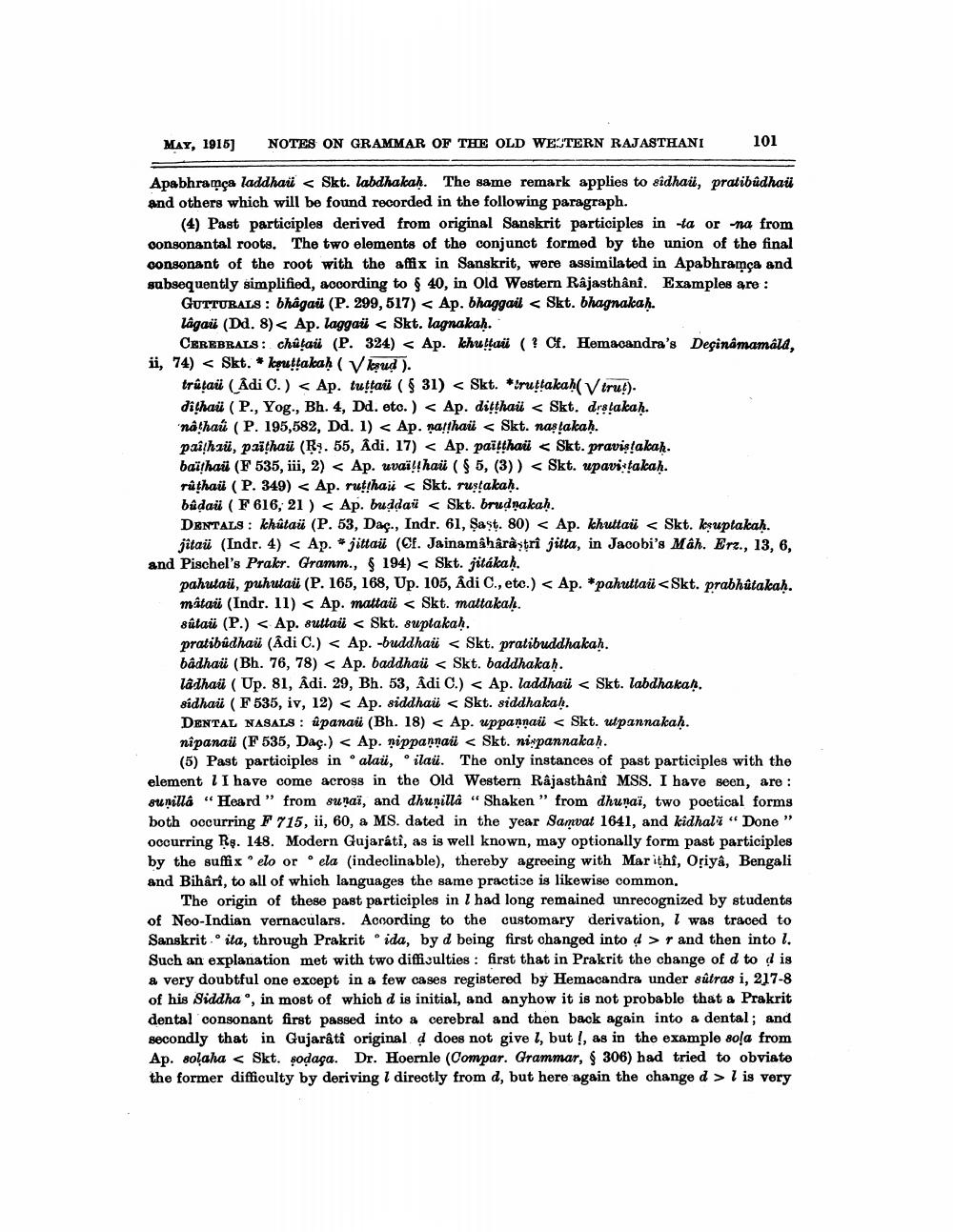________________
MAY, 1916)
NOTES ON GRAMMAR OF THE OLD WESTERN RAJASTHANI
101
Apabhramca laddhau < Skt. labdhakah. The same remark applies to sidhau, pratibûdhail and others which will be found recorded in the following paragraph.
(4) Past participles derived from original Sanskrit participles in ta or na from oonsonantal roots. The two elements of the conjunct formed by the union of the final consonant of the root with the affix in Sanskrit, were assimilated in Apabhramça and subsequently simplified, according to 40, in Old Western Rajasthani. Examples are :
GUTTURALS: bhagai (P. 299, 517) < Ap. bhaggail < Skt. bhagnakah. lágai (Da. 8) Ap. laggaü < Skt. lagnakah.
CEREBRALS: chataü (P. 324) < Ap. Khuttaü (? Cf. Hemacandra's Decinamamala, ü, 74) < Skt. * ksuttakaḥ ( kesud).
trútaü (Adi C.) < Ap. tuttaü (31) < Skt. *rutlakah( trut). dichaü (P., Yog., Bh. 4, Dd. etc.) < Ap. ditthait < Skt. drs!akah. nathaú (P. 195,582, Dd. 1) Ap. narthaü < Skt. naslakah. pailhaü, paithaü (Rs. 55, Adi. 17) < Ap. paitthau < Skt. pravis!akak. baithaü (F 535, iii, 2) < Ap. uvail!haü ($ 5, (3)) < Skt. upavi takah. råthaü (P. 349) < Ap. rutthai < Skt. rustakaḥ. búdai (F 616, 21 ) < Ap. buddaü < Skt. brudnakah. DENTALS: khůtaü (P. 53, Daç., Indr. 61, Şast. 80) < Ap. khuttaü < Skt. kesuptakah.
vitaü (Indr. 4) < Ap. * jittaü (Cf. Jainamaharastri jitta, in Jacobi's Mâh. Erz., 13. 6. and Pischel's Prakr. Gramm., 194) < Skt. jitákah.
pahutai, puhutaü (P. 165, 168, Up. 105, Adi C., etc.) < Ap. *pahuttaü <Skt. prabhůtakah. mataü (Indr. 11) < Ap. mattaü < Skt. mattakah 8ûtaü (P.) < Ap. suttaü < Skt. suptakah. pratibúdhaü (Adi C.) < Ap. -buddhaü < Skt. pratibuddhakah. badhai (Bh. 76, 78) < Ap. baddhaü < Skt. baddhakah. ladhaü (Up. 81, Adi. 29, Bh. 53, Adi C.) < Ap. laddhaü < Skt. labdhakan. sidhaü (F 535, iv, 12) < Ap. siddhaü < Skt. siddhakah. DENTAL NASALS: úpanaü (Bh. 18) < Ap. uppannaü < Skt. utpannakah. nipanai (F 535, Dac.) < Ap. nippannai < Skt. ninpannakah.
(5) Past participles in alaü, ilaü. The only instances of past participles with the element 1 I have come across in the Old Western Râjasthânî MSS. I have seen, are : sunilla “Heard" from sunai, and dhunilla “Shaken" from dhunai, two poetical forms both occurring F 715, ii, 60, a MS. dated in the year Samvat 1641, and kidhali" Done" occurring Rs. 148. Modern Gujarati, as is well known, may optionally form past participles by the suffixelo or ela (indeclinable), thereby agreeing with Marithi, Oriya, Bengali and Bihari, to all of which languages the same practice is likewise common.
The origin of these past participles in l had long remained unrecognized by students of Neo-Indian vernaculars. According to the customary derivation, I was traced to Sanskrit. ita, through Prakritida, by d being first changed into d >r and then into l. Such an explanation met with two diffisulties: first that in Prakrit the change of d to d is a very doubtful one except in a few cases registered by Hemacandra under sûtras i, 217-8 of his Siddha', in most of which d is initial, and anyhow it is not probable that a Prakrit dental consonant first passed into a cerebral and then back again into a dental; and secondly that in Gujarati original d does not give 1, but !, as in the example sola from Ap. soļaha < Skt. sodaça. Dr. Hoernle (Compar. Grammar, $ 306) had tried to obviate the former difficulty by deriving 1 directly from d, but here again the change d > l is very




